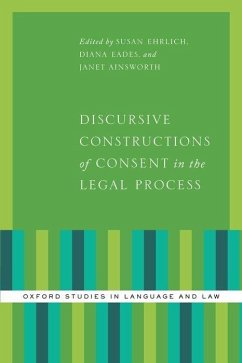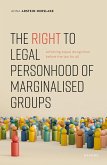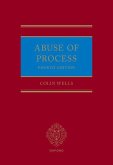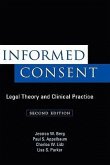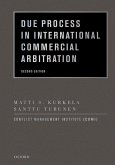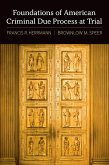Ehrlich
Discursive Constructions of Consent in the Legal Process
Ehrlich
Discursive Constructions of Consent in the Legal Process
- Gebundenes Buch
- Merkliste
- Auf die Merkliste
- Bewerten Bewerten
- Teilen
- Produkt teilen
- Produkterinnerung
- Produkterinnerung
Experts in linguistics and law use diverse theoretical and analytical approaches to demonstrate the complex ways in which language is used to seek, steer, give, or withhold consent in a range of legal contexts. The book illuminates problematic issues in legal practices and procedures that may otherwise be uncritically accepted.
Andere Kunden interessierten sich auch für
![The Right to Legal Personhood of Marginalised Groups The Right to Legal Personhood of Marginalised Groups]() Anna Arstein-KerslakeThe Right to Legal Personhood of Marginalised Groups113,99 €
Anna Arstein-KerslakeThe Right to Legal Personhood of Marginalised Groups113,99 €![Abuse of Process Abuse of Process]() Colin WellsAbuse of Process142,99 €
Colin WellsAbuse of Process142,99 €![Informed Consent Informed Consent]() Jessica W BergInformed Consent106,99 €
Jessica W BergInformed Consent106,99 €![Due Process in International Commercial Arbitration (Revised) Due Process in International Commercial Arbitration (Revised)]() Matti KurkelaDue Process in International Commercial Arbitration (Revised)341,99 €
Matti KurkelaDue Process in International Commercial Arbitration (Revised)341,99 €![Foundations of American Criminal Due Process at Trial Foundations of American Criminal Due Process at Trial]() Francis R HerrmannFoundations of American Criminal Due Process at Trial122,99 €
Francis R HerrmannFoundations of American Criminal Due Process at Trial122,99 €![Disability and Employment in the United States Disability and Employment in the United States]() Stephanie PattersonDisability and Employment in the United States237,99 €
Stephanie PattersonDisability and Employment in the United States237,99 €![International Agreements Without the Advice and Consent of the Senate International Agreements Without the Advice and Consent of the Senate]() James Foote BarnettInternational Agreements Without the Advice and Consent of the Senate26,99 €
James Foote BarnettInternational Agreements Without the Advice and Consent of the Senate26,99 €-
-
-
Experts in linguistics and law use diverse theoretical and analytical approaches to demonstrate the complex ways in which language is used to seek, steer, give, or withhold consent in a range of legal contexts. The book illuminates problematic issues in legal practices and procedures that may otherwise be uncritically accepted.
Produktdetails
- Produktdetails
- Verlag: Oxford University Press
- Seitenzahl: 344
- Erscheinungstermin: 1. Februar 2016
- Englisch
- Abmessung: 236mm x 165mm x 33mm
- Gewicht: 590g
- ISBN-13: 9780199945351
- ISBN-10: 0199945357
- Artikelnr.: 47870123
- Herstellerkennzeichnung
- Libri GmbH
- Europaallee 1
- 36244 Bad Hersfeld
- gpsr@libri.de
- Verlag: Oxford University Press
- Seitenzahl: 344
- Erscheinungstermin: 1. Februar 2016
- Englisch
- Abmessung: 236mm x 165mm x 33mm
- Gewicht: 590g
- ISBN-13: 9780199945351
- ISBN-10: 0199945357
- Artikelnr.: 47870123
- Herstellerkennzeichnung
- Libri GmbH
- Europaallee 1
- 36244 Bad Hersfeld
- gpsr@libri.de
Susan Ehrlich is Professor of Linguistics at York University in Toronto. Diana Eades is Adjunct Professor at University of New England. Janet Ainsworth is the John D. Eshelman Professor of Law at Seattle University and Research Professor in the Research Center for Legal Translation at China University of Political Science and Law.
* Chapter 1
* Introduction: Linguistic and Discursive Dimensions of Consent
* Susan Ehrlich and Diana Eades
* Section 1: Free and voluntary consent
* Chapter 2
* Culture, cursing, and coercion: The impact of police officer swearing
on the voluntariness of consent to search in police-citizen
interactions
* Janet Ainsworth
* Chapter 3
* Post-penetration rape: Coercion or freely-given consent?
* Susan Ehrlich
* Chapter 4
* Erasing context in the courtroom construal of consent
* Diana Eades
* Section 2: Informed consent vs. ritualized consent
* Chapter 5
* Talking the ethical turn: Drawing on tick-box consent in policing
* Frances Rock
* Chapter 6
* Transparent and opaque consent in contract formation
* Lawrence Solan
* Chapter 7
* The empty performative?: Informed consent to genetic research
* John Conley, R. Jean Cadigan and Arlene Davis
* Section 3: The influence of discursive practices
* Chapter 8
* Promoting litigant consent to arbitration in multilingual small
claims court
* Philipp Sebastian Angermeyer
* Chapter 9
* Consent and compliance in youth justice conferences?
* Michele Zappavigna, Paul Dwyer and J. R. Martin
* Chapter 10
* Non-consent and discursive resistance: Radical reformulation in a
post-sting police interview
* Philip Gaines
* Section 4: The coercive force of cautions
* Chapter 11
* Totality of circumstances and translating the Miranda warnings
* Susan Berk-Seligson
* Chapter 12
* Negotiating the right to remain silent in inquisitorial trials
* Fleur van der Houwen and Guusje Jol
* Chapter 13
* 'No comment' responses to questions in police investigative
interviews
* Elizabeth Stokoe, Derek Edwards and Helen Edwards
* Introduction: Linguistic and Discursive Dimensions of Consent
* Susan Ehrlich and Diana Eades
* Section 1: Free and voluntary consent
* Chapter 2
* Culture, cursing, and coercion: The impact of police officer swearing
on the voluntariness of consent to search in police-citizen
interactions
* Janet Ainsworth
* Chapter 3
* Post-penetration rape: Coercion or freely-given consent?
* Susan Ehrlich
* Chapter 4
* Erasing context in the courtroom construal of consent
* Diana Eades
* Section 2: Informed consent vs. ritualized consent
* Chapter 5
* Talking the ethical turn: Drawing on tick-box consent in policing
* Frances Rock
* Chapter 6
* Transparent and opaque consent in contract formation
* Lawrence Solan
* Chapter 7
* The empty performative?: Informed consent to genetic research
* John Conley, R. Jean Cadigan and Arlene Davis
* Section 3: The influence of discursive practices
* Chapter 8
* Promoting litigant consent to arbitration in multilingual small
claims court
* Philipp Sebastian Angermeyer
* Chapter 9
* Consent and compliance in youth justice conferences?
* Michele Zappavigna, Paul Dwyer and J. R. Martin
* Chapter 10
* Non-consent and discursive resistance: Radical reformulation in a
post-sting police interview
* Philip Gaines
* Section 4: The coercive force of cautions
* Chapter 11
* Totality of circumstances and translating the Miranda warnings
* Susan Berk-Seligson
* Chapter 12
* Negotiating the right to remain silent in inquisitorial trials
* Fleur van der Houwen and Guusje Jol
* Chapter 13
* 'No comment' responses to questions in police investigative
interviews
* Elizabeth Stokoe, Derek Edwards and Helen Edwards
* Chapter 1
* Introduction: Linguistic and Discursive Dimensions of Consent
* Susan Ehrlich and Diana Eades
* Section 1: Free and voluntary consent
* Chapter 2
* Culture, cursing, and coercion: The impact of police officer swearing
on the voluntariness of consent to search in police-citizen
interactions
* Janet Ainsworth
* Chapter 3
* Post-penetration rape: Coercion or freely-given consent?
* Susan Ehrlich
* Chapter 4
* Erasing context in the courtroom construal of consent
* Diana Eades
* Section 2: Informed consent vs. ritualized consent
* Chapter 5
* Talking the ethical turn: Drawing on tick-box consent in policing
* Frances Rock
* Chapter 6
* Transparent and opaque consent in contract formation
* Lawrence Solan
* Chapter 7
* The empty performative?: Informed consent to genetic research
* John Conley, R. Jean Cadigan and Arlene Davis
* Section 3: The influence of discursive practices
* Chapter 8
* Promoting litigant consent to arbitration in multilingual small
claims court
* Philipp Sebastian Angermeyer
* Chapter 9
* Consent and compliance in youth justice conferences?
* Michele Zappavigna, Paul Dwyer and J. R. Martin
* Chapter 10
* Non-consent and discursive resistance: Radical reformulation in a
post-sting police interview
* Philip Gaines
* Section 4: The coercive force of cautions
* Chapter 11
* Totality of circumstances and translating the Miranda warnings
* Susan Berk-Seligson
* Chapter 12
* Negotiating the right to remain silent in inquisitorial trials
* Fleur van der Houwen and Guusje Jol
* Chapter 13
* 'No comment' responses to questions in police investigative
interviews
* Elizabeth Stokoe, Derek Edwards and Helen Edwards
* Introduction: Linguistic and Discursive Dimensions of Consent
* Susan Ehrlich and Diana Eades
* Section 1: Free and voluntary consent
* Chapter 2
* Culture, cursing, and coercion: The impact of police officer swearing
on the voluntariness of consent to search in police-citizen
interactions
* Janet Ainsworth
* Chapter 3
* Post-penetration rape: Coercion or freely-given consent?
* Susan Ehrlich
* Chapter 4
* Erasing context in the courtroom construal of consent
* Diana Eades
* Section 2: Informed consent vs. ritualized consent
* Chapter 5
* Talking the ethical turn: Drawing on tick-box consent in policing
* Frances Rock
* Chapter 6
* Transparent and opaque consent in contract formation
* Lawrence Solan
* Chapter 7
* The empty performative?: Informed consent to genetic research
* John Conley, R. Jean Cadigan and Arlene Davis
* Section 3: The influence of discursive practices
* Chapter 8
* Promoting litigant consent to arbitration in multilingual small
claims court
* Philipp Sebastian Angermeyer
* Chapter 9
* Consent and compliance in youth justice conferences?
* Michele Zappavigna, Paul Dwyer and J. R. Martin
* Chapter 10
* Non-consent and discursive resistance: Radical reformulation in a
post-sting police interview
* Philip Gaines
* Section 4: The coercive force of cautions
* Chapter 11
* Totality of circumstances and translating the Miranda warnings
* Susan Berk-Seligson
* Chapter 12
* Negotiating the right to remain silent in inquisitorial trials
* Fleur van der Houwen and Guusje Jol
* Chapter 13
* 'No comment' responses to questions in police investigative
interviews
* Elizabeth Stokoe, Derek Edwards and Helen Edwards

